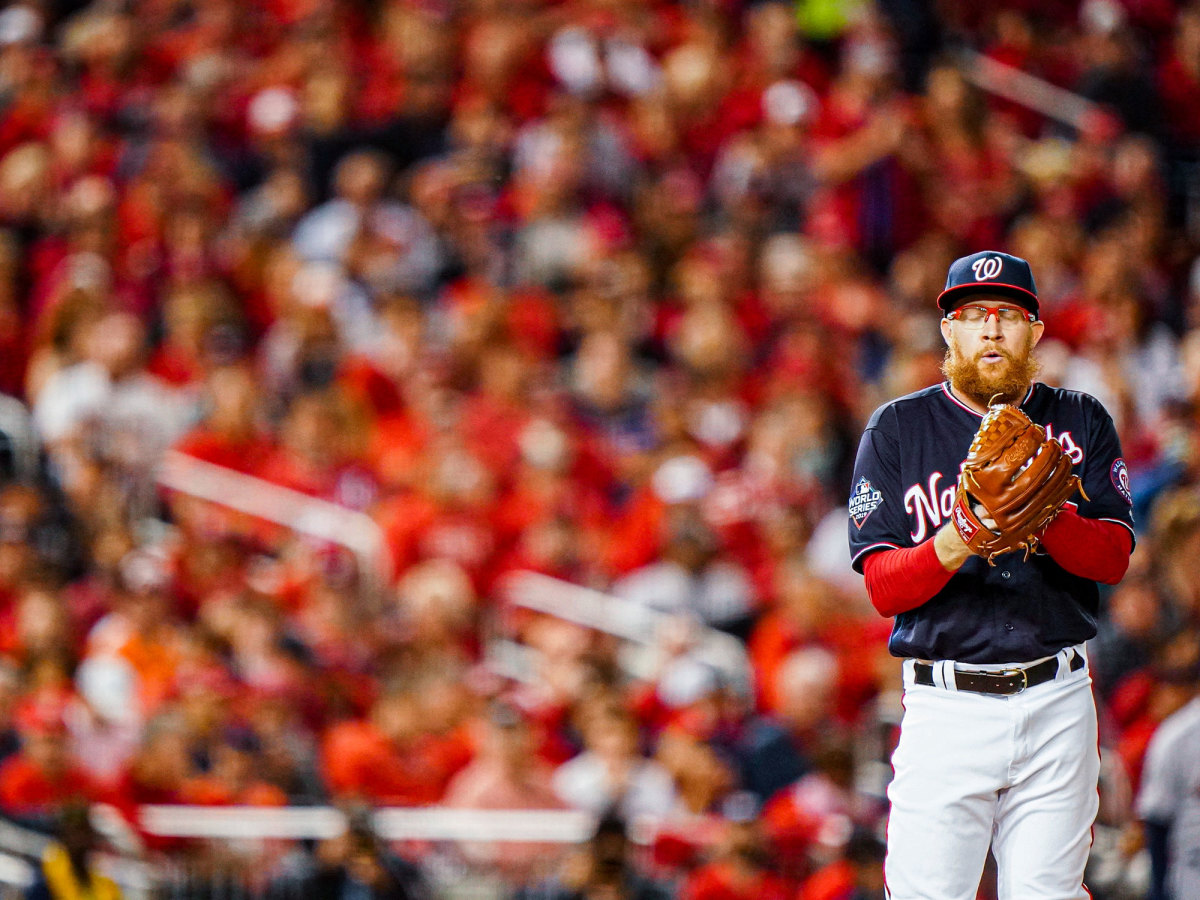An Activist and a Bookworm, Sean Doolittle Is the Conscience of Baseball
Sean Doolittle’s plan to visit a bookstore on every road trip last season did not originate as any sort of serious plan at all. It started as simply a way to get some books. The Nationals’ reliever, 33, reads voraciously. He reads because he has to.
Doolittle has had the same in-season routine for a few years now—after a game, at home or in his hotel room, he reads for an hour or two before bed. (If he’s at a particularly good point in a book, he’ll carve out more time the next morning before he heads to the park.) It’s a relatively small part of his day. But it’s become crucial to his relationship with baseball and with himself.
As Doolittle worked his way into the majors—an extended process, with a set of injuries that sidelined him for full seasons after he was drafted out of the University of Virginia in 2007—he realized that baseball dictated the conditions of his entire life. It set the tone for everything; to pitch well was to enjoy a night thinking about nothing else; to pitch poorly was to be condemned to the same. He had no outlet outside of baseball because he had neither space nor energy for it. When he spent time on the injured list, everything went dark. “My whole life, my everything—I was consumed by baseball,” he says. “How that was going determined how I was feeling about literally anything.” The game had come to determine not only what he did but who he was.
“It’s something that he’s always been comfortable going into,” Doolittle’s wife, Eireann Dolan, says about watching him handle the pressure of his role as a closer. Before he came to the mound each day, his tendency to wrap his whole self in his job was an asset, the source of that ability to feel comfortable. After he left the park, however, his inability to disconnect was a struggle. “When all of your energy—your work and focus and adrenaline—is condensed into ten minutes at ten o’clock at night, when he’s actually pitching, it’s very hard to come down from… And it’s just very hard then not to let that be your entire identity, as the guy who either saved the day or ruined the day.”

So Doolittle looked for an answer—a way to get out of his head after he left the ballpark each evening. He tried playing video games. He tried streaming television shows until he fell asleep, laptop in bed next to him. And, finally, he found it: He’d read science-fiction novels.
“I don’t exactly remember when it clicked for me,” he says. “But reading is just a way for my brain to focus on something else. And that’s why I chose fiction. That’s why I like sci-fi. It’s very much an escape, an alternate reality that has nothing to do with baseball or sports or anything going on.”
His nightly sci-fi did what nothing else had been able to. It gave him space to fall asleep consumed by something other than baseball. “It happened very suddenly,” Dolan says. “He decided that he just needed some way to find a different world.”
His favorite book now is one of the first titles that he read in his foray into sci-fi, Octavia Butler’s The Parable of the Sower, which follows a girl with the gift of “hyper-empathy” through a dystopian society wrecked by climate change. (“If you read that, you have to read The Parable of Talents, which is the sequel. It’s a duology.”) The genre is always the first section that he visits in a new bookstore. But he’s expanding his tastes. He tries to read a diverse set of authors, interested in how different life experiences can develop the perspective of fiction, and this winter, away from the stress of the season, he started more nonfiction. He takes recommendations from Dolan, who spent last season earning her second master’s degree and frequently accompanies him to bookstores: “She’s way smarter than me.” (Now, with baseball postponed indefinitely, Doolittle reads as frequently and broadly as ever, finishing four books in the first week after spring training was cancelled: Christy Lefteri’s The Beekeeper of Aleppo, about refugees from Syria; Michael Poore’s Reincarnation Blues, a novel about a man who dies thousands of times; Beth Macy’s Dopesick, a non-fiction chronicle of the opioid crisis; and Helene Wecker’s historical fantasy fiction The Golem and the Jinni.)
So Doolittle’s bookstore odyssey across MLB filled a practical need. (Yes, he heard a few complaints about his heavy luggage from clubhouse attendants, but he says that on the few occasions when he and Dolan got “really carried away” on the road, they shipped their books home.) But as the project grew into something bigger—a way to connect with the cities he played in and to do volunteer work around reading and literacy—it fit in perfectly with the rest of the civic-minded pitcher’s efforts.
Doolittle’s concerns about the world outside baseball caught widespread notice when he declined to visit the White House in November after the World Series. (“My wife and I stand for inclusion and acceptance,” he told the Washington Post.) But this was hardly the first time that he’d voiced a political opinion: Doolittle and Dolan have been vocal for years about their work with Syrian refugees, LGBTQ youth, and wounded veterans, among other groups. His Twitter feed offers steady commentary on causes that he cares about—“I don’t want to be mad online, I want it to be constructive,” he says, noting that he leaves plenty of would-be tweets in the drafts folder—and he tries to do leg-work before speaking out. When Doolittle and Dolan wrote an op-ed about mental healthcare for veterans in SI in 2017, they scheduled a series of briefings to learn as much as possible about the subject. Before he announced his decision on the visit to the White House, Doolittle researched how other athletes had shared similar choices, and as he got more involved in promoting bookstores, he studied the numbers on childhood literacy and reached out to D.C. Public Libraries to work with them back in Washington.

“We try to get involved so that we have skin in the game,” Doolittle says. “I think it makes some of the work that we’ve done more effective when people see that some effort’s going on in the back end. It serves to lend an authenticity to it—that this is something that we can speak to from experience, or from an educated perspective, or that we’ve used our platform to elevate someone else’s voice.”
He’s similarly vocal about the direction and welfare of baseball—everything from questioning the motivations of stingy front offices to sharing concern over rising ticket prices to advocating for the union workers responsible for ballcaps.
“If you’re in the big leagues, the game has been so good to you that you don’t want to see it fade away,” Doolittle says. “You want to come out every night to a stadium that’s a packed house. You want every team to be competing in free agency and making aggressive trades to try to improve their club and not just their bottom line… It’s all tied together. If we’re acting in the best interests of furthering the growth of the game and engaging our fans, making our game more accessible, we need to take responsibility for the future.”
He’ll be a free agent for the first time after this season, after signing an extension in 2014 when he was with the Oakland A’s; he knows that he may not face a hot market as a reliever “over the hill in baseball years.” But that won’t keep him quiet. “You can feel like there’s a target on your back,” he says. “But I think that makes it more important to speak out. I think sometimes people at the top might be banking on people not wanting to share their opinions.”
Doolittle used part of his share of the World Series money to buy signed first editions of the autobiographies of MLB’s first union leader, Marvin Miller, and first free agent, Curt Flood. (He’d already read both, but he felt this “was an appropriate way” to spend the money.) It shouldn’t shock his teammates, who already know him as a reliable resource for any discussion about either books or baseball labor, as he was excited to see one day last spring.
“It was having guys in spring training talking to me about not just books, but Lords of the Realm,” he says, referencing John Helyar’s 1994 work on baseball as a business and the history of its labor relations. “Talking about Lords of the Realm while we’re warming up before team stretch! It’s not the norm, but it’s also not as uncharacteristic or uncommon as it might have been like five years ago.”
For questions on any other subject, just ask. He probably has a book about it.
This story appears in the MLB Preview issue of Sports Illustrated. To subscribe, click here.
